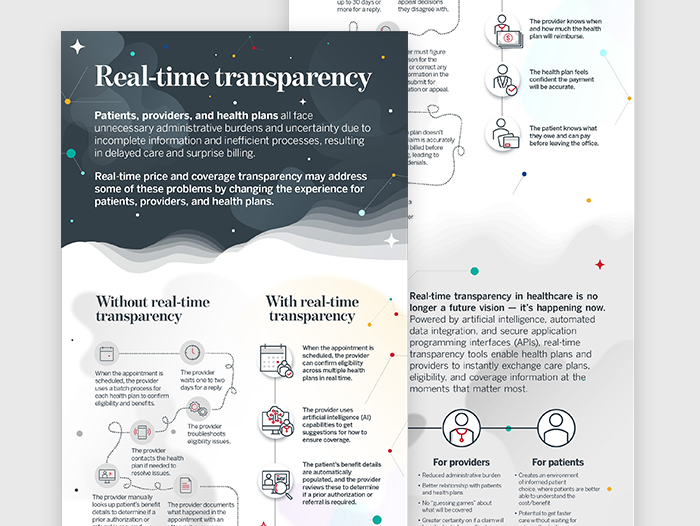Auto logout in seconds.
Continue LogoutWriting for the Wall Street Journal, Vipal Monga explains how technology companies are creating artificial intelligence (AI) tools to diagnose Alzheimer's from eye scans and blood tests, as well as the potential obstacles that could hinder this technology from becoming more widespread.
How AI could help diagnose Alzheimer's
Over 7 million people in the United States currently have Alzheimer's, and it was the sixth-leading cause of death in the country in 2021, excluding COVID-19. Although researchers have studied specific hallmarks of Alzheimer's, such as brain inflammation and neurodegeneration, for years, the exact causes of the disease are still unknown.
Currently, people with symptoms can get diagnosed with Alzheimer's by undergoing a spinal tap or PET scan to determine if they have high levels of amyloid or tangled strands of tau, which are commonly found in patients with the disease. These scans are considered the gold standard of Alzheimer's diagnosis, with PET scans having a success rate of close to 90%.
However, the machines for the scans are not widely available, and patients may wait weeks for a diagnosis. The scans are also expensive, and since insurers don't typically cover them, they can cost patients around $6,000 out of pocket.
To make the diagnosis process faster and cheaper, some technology companies are now turning to AI tools to analyze patient data for signs of Alzheimer's.
One such company is RetiSpec, which has developed an AI algorithm that it claims can analyze results from an eye scanner and identify signs of Alzheimer's 20 years before any symptoms appear. In a recent study of 271 patients, the algorithm was 80% accurate in detecting unique optical signatures that are associated with signs of amyloid in the brain.
"There still remains a huge amount we fundamentally don't understand about the brain and how it works," said RetiSpec co-founder Eliav Shaked. "The power in AI is that it can help connect the dots."
Another company is Neurovision, which uses machine learning to develop retinal scans and blood tests to identify patients who are at risk of Alzheimer's and other types of dementia. The company's AI model analyzes eyes scans or blood vessels for any abnormalities that may be associated with Alzheimer's.
According to Steven Verdooner, Neurovision's co-founder, it can be difficult for the human eye to distinguish abnormalities in scans since many of them have dark areas and plaque deposits may be very small. In comparison, he said that the company's "algorithm does a better job."
Separately, Rui Chang, a neurology associate professor at the University of Arizona College of Medicine, developed an AI model that aims to identify genetic triggers associated with Alzheimer's. According to Chang, the traditional approach is extremely slow and "like looking at the forest one tree at a time."
In comparison, the AI model can take in significantly more information at one time and find patterns humans might overlook. The model was able to identify 6,000 gene targets that could impact how Alzheimer's develops in two months, which Chang said cut down his research time by a decade.
Chang has also founded a company called Path-Biotech, and it will begin clinical trials with his AI model next year.
Obstacles still stand in the way
According to Matt Leming, a research fellow at Massachusetts General Hospital, AI tools in medical research may perform well in clinical tests, but this doesn't mean that they will do as well in real-life situations.
"Biotech AI models are finicky," he said.
AI also generally learns better when it has large volumes of data to train on. For example, generative AI models like ChatGPT are good at analyzing and mimicking writing because it learns from text taken from across the internet.
In comparison, medical data is much more scarce and often proprietary. This means that AI biotech tools have more limited samples to train on, and results may be affected by the wider variations in cases seen in a clinical vs. laboratory setting.
"When it comes to AI fundamentally changing the way we do medicine, I don't think it is going to happen," Leming said.
However, many companies are currently trying to address the issue of limited data. For example, RetiSpec has taken samples from 14 research partners, which includes data from racially and socioeconomically diverse communities. Other companies have also made efforts to minimize errors and improve prediction accuracy.
"Some of the most important work we've done is to make sure the AI doesn't suffer from garbage in and garbage out," Shaked said. (Monga, Wall Street Journal, 10/10)
The FDA has already approved over 250 radiology-related AI products, and the opportunities to utilize AI in imaging are quickly growing. Get industry insights from our 2023 Imaging AI Survey and discover answers to imaging leaders' most pressing questions about how to leverage AI for success.
Don't miss out on the latest Advisory Board insights
Create your free account to access 1 resource, including the latest research and webinars.
Want access without creating an account?
You have 1 free members-only resource remaining this month.
1 free members-only resources remaining
1 free members-only resources remaining
You've reached your limit of free insights
Become a member to access all of Advisory Board's resources, events, and experts
Never miss out on the latest innovative health care content tailored to you.
Benefits include:
You've reached your limit of free insights
Become a member to access all of Advisory Board's resources, events, and experts
Never miss out on the latest innovative health care content tailored to you.
Benefits include:
This content is available through your Curated Research partnership with Advisory Board. Click on ‘view this resource’ to read the full piece
Email ask@advisory.com to learn more
Click on ‘Become a Member’ to learn about the benefits of a Full-Access partnership with Advisory Board
Never miss out on the latest innovative health care content tailored to you.
Benefits Include:
This is for members only. Learn more.
Click on ‘Become a Member’ to learn about the benefits of a Full-Access partnership with Advisory Board
Never miss out on the latest innovative health care content tailored to you.


